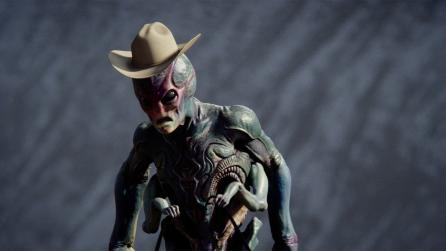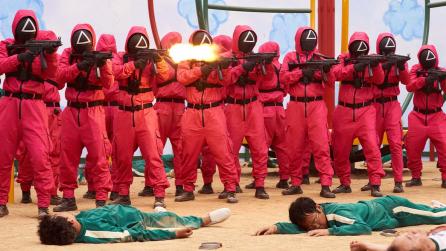Where curiosity and passion meet, an artist’s oeuvre is born.
Before finding the freedom of working as a freelance Compositor, Post Producer and VFX Supervisor, Jörn Meyer started out three decades ago as a trainee for Speckert & Partner, a small post-production company in Hamburg.
“Speckert & Partner had the first full digital post-pipeline in Germany’’, Jörn tells us. “Full digital, at that time, meant that we edited on digital video formats like D1 or DigiBeta with an edit controller and real-time effects hardware—in this case, a Grass Valley Kadenza and Kaleidoscope. Later, non-linear editing was introduced and for online finishing we had an HAL (Heuristically programmed ALgorithmic computer) and, even later, Editbox (both Quantel), which led me to compositing and finishing in the sense of what we understand of it nowadays.’’
The complexity of an artist and their work is usually difficult to untangle but it seemingly gets easier when we just get to the root of it: what’s the engine behind a successful career in VFX? And why VFX in particular? It may be different for everyone but, for Jörn, “it’s the fascination of magic—to visualize things which don't yet exist.”

“I’m very technical, future oriented and like Sci-Fi very much. I believe this genre, at least partly, predicts the future because what preoccupies us manifests itself here. Utopia and dystopia of mankind visualized. When I started at my first company, the edit suite looked like a control room of a spaceship. I don’t know where I would have preferred to work. If I would have to say what pushed me in one word: curiosity.”
We wanted to find out more about his career journey, discover how—and some of the reasons why—he uses Nuke Studio in his day-to-day post-production work and take the temperature on the future of VFX predictions. So we sat down with Jörn: a “one-man company” who sees his job as a hobby but also enjoys canoeing and skateboarding, a visionary who wouldn’t shy away from working on a remake of Metropolis (a dystopian classic and also his favorite film), an artist.
Q: What helps you get in ‘the zone’ when you start working on a project? Do you have a routine that helps you concentrate/visualize your ideas better?
A: A coffee, good music and a deep analysis of the material I have to work on.


Q: What was the course of your career after working as a trainee?
With the growing demand of VFX, it happened more and more often to plan for shooting and supervise the VFX shoots on set. By the end of the 90s, I switched to Das Werk (named Bildwerk at that time) which was the biggest post-production service company in Germany at that time. Soon, I introduced Discreet Logic Flint there and it didn’t take long that we upgraded to Inferno. At that time, I already had an eye on Nuke which was developed by Digital Domain and still far from a commercial product.
Around the year 2000, I co-founded The Posthouse in Hamburg (Optix nowadays) where I used Nuke for the first time. From 2004 onwards, I’ve spent ten years partly freelance, partly permanent at companies in Hamburg with VFX Supervision, compositing and pipeline development. In my last permanent employment at Plexus Productions until 2014, we developed a cloud-based asset management system, suitable for the commercials business which got attention at Future Zone at IBC. Since mid-2014, I’ve been working independently again and doing VFX and post-production with a network of international artists via the internet.
Q: Do you remember your first project?
A: I remember doing a cleanup-job for a praline commercial. A cherry, falling into a liquid. At that time, there didn’t exist moving images on hard drives. So, I had to load every single frame (PAL) from a videotape into the RAM of a PC where I was able to paint somehow on the frame (I think cloning didn’t even exist) and record it back to tape. A troublesome affair. To judge the result, you later had to jog the tape.

Q: What projects are you most proud of, and why?
A: I think it's this project: being CEO, CTO, Post/VFX Producer and Supervisor, Compositor, Coder, Accountant, Tax Consultant and whatever you need to run a business in one person. Besides still having enough time for the family. I think it’s an inherited disease. I should outsource at least some administrative stuff but I always have to know how things work.
After all, it keeps me very independent, flexible and quick in decisions on the job—which is appreciated by my clients. Also I can offer very interesting rates. I like my technical setup—I always try to keep things as simple as possible, which is quite complicated sometimes. I’m not shy to overthink things from the ground up and throw concepts away when I’m convinced there’s a better solution.
Q: Can you please describe your usual workflow?
A: It depends on the task. For a straightforward online job with delivered graded, selected takes: (Auto)-Conform > transcode, eventually downres > prep plates and comps > distribute work > review/iterate > adapt formats > mastering
All of this takes place in Nuke Studio and I have my own standard-templates defined for most of the processes. Here, the great openness of this software pays off for me. For instance—with a few clicks, I render plates to a senseful resolution as EXRs, inside a file structure which makes it easy for me to distribute shots to external artists, create the corresponding comps at the same time, and get the results as versions in a convenient way back into the timeline. I just started writing a Python-script for this. With my file structure, archiving and restoring of projects is also simple because it’s basically a copy process. With all this, I avoid a lot of redundancy and unnecessary complexity.

Q: Did the way you work/your workflows change over the years, from project to project?
A: The main basic workflow hasn't changed for quite some years now, basically because I think you can’t simplify much more. But a lot of my working time is thinking about what can be improved and how. A long time I pondered about folder structures. Sometimes, I rethink file formats or which channels I use for interchanging material but, nowadays, it’s mainly about details. Automation, for example. After 30 years of post-production, I just started to learn Python. I forgot how much fun programming is. The last time I did it was long ago when I was still in school and it was in Basic and, later, machine language. My first Python-project is to automate as much as possible for turnarounds with external colleagues, as described earlier.
Q: What are the main differences between working on commercials/advertising projects and feature films projects?
A: From my experience, it’s mainly the time planning. In the commercial business, you almost never have the time you would need to do the job right. Also, for German feature film projects you never have the budget to make VFX on a Hollywood level. But it depends very much on the clients and their experiences and affinity for VFX. You have to be able to compromise.
Q: How does Nuke Studio support you with your advertising projects? What problems does it solve?
A: Nuke Studio is the central hub in my day-to-day post-production work. I try to keep everything simple, so the less switching between software, the better. This is possible with Nuke Studio because from conform to mastering you basically don’t have to switch to anything else.
Q: How and when did you start using Nuke Studio?
A: I think it was 2015 when I used Nuke Studio for the first time on a job. There was a project at one of the big German post-production houses which was spread across three offices in Hamburg, Berlin and Düsseldorf. It was supposed to be done in ACES, which was a little experimental for me at that time. Although I must admit that we had some issues—mainly with real-time playback and monitoring— it was the right decision for me to use Nuke Studio, mainly because of its sophisticated color management. Luckily, the playback and monitoring are much better since then.
Q: How did you find the transition to Nuke Studio?
A: I used Flame for a long time and I really loved it. But at some time it was the same thing as with my transition from Henry/Editbox to Flame/Inferno. The “blackbox factor” bugged me more and more. Besides that, with the growing number of functions, the layout of the GUI became weird. To put it in the wording of the German translation of Ash’s words in Alien, I admired Nuke’s conceptual purity. In my opinion, it contains the most sophisticated functions, it’s really the Swiss army knife for moving image manipulation. Later, when Nuke Studio came, conceptually there was no reason for me to use another software any longer.


Q: Do you have a favorite feature of Nuke Studio?
A: It’s very good to have the best compositor you can get directly accessible in the timeline so everything is in one place.
Q: As you are working as a freelancer at the moment, is there a favorite industry you prefer working with?
A: No, actually it doesn’t matter. It really depends on the film idea and the tasks resulting from it. The only general thing I can say is that the industry or company must be ethically acceptable.
Q: What are the pros and cons of working as a freelancer?
A: As the word "freelancer" implies, the biggest advantage for me is the freedom that comes with it. That starts with working hours and holidays and continues with the freedom to decide which way we go on a job—at least technically—and being able to decide with which clients you probably don’t want to work. On the other hand, you also have to make decisions and do things you wouldn’t have to make or do as a permanent employee. Definitely, you have to be able to manage your finances well in order not to get into situations that take away this freedom.
Q: Do you have any wider tips for aspiring Compositors and VFX Supervisors looking to break into the VFX industry?
A: Stay curious, try things out, believe in yourself, and don't forget to take care of your physical and mental health.
Q: What do you see in the future of the VFX industry? Are there any trends that you think will be with us in the long term?
A: There have always been new technologies that have been heralded as a great revolution. Not all of them have come true, but I believe that AI will be a game changer. Not overnight, but it will gradually spread to all areas because it is so universal—just like humans.

